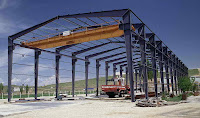What's Civil Engineering??
Civil engineering is one branch of engineering science that studies about how to design, build, renovate not only the buildings and infrastructure, but also includes the environment for the benefit of human life.
Civil engineering has a wide scope, in which knowledge of mathematics, physics, chemistry, biology, geology, environment until the computer has the role of each. Civil engineering was developed in line with the level of human needs and movements, until it can be said of this knowledge can change a forest into a big city.
Branches of Science in Civil Engineering:
1. Structural: Branch who studied the structural problem of the materials used for construction. A building form may be made from several choices of materials such as steel, concrete, wood, glass or other materials. Every material has the characteristics of each. Science field of study structural properties of the material that may ultimately be selected where suitable material for this type of building. In this field more deeply studied issues related to structural design of buildings, roads, bridges, tunnels from building to building foundation is ready for use.
2. Geotechnical engineering: The branch that studies the structure and properties of various kinds of soil in sustaining a building that will stand on it. Coverage can be a field investigation, which is investigating the circumstances of a regional soil and reinforced with laboratory investigations.
3. Construction Management: Branch is studying the problems in construction projects relating to economy, job scheduling, return of capital, cost of the project, all matters relating to law and building permits until the organization of work in the field so that the buildings are completed on time.
4. Hydrology: The branch which studies water, distribution, and control problems. These areas include among others water hydrology branch of science (with respect to weather, rainfall, water discharge of a river, etc.), hydraulics (material properties of water, water pressure, the thrust of water etc.) and water structure such as ports, dams, irrigation, dams / dams, canals.
5. Environmental Engineering: The branch which studies issues and environmental issues. This area includes, among others, provision of clean water infrastructure, waste management and waste water, river pollution, noise pollution and air until remedial techniques.
6. Transportation: The branch of learning about the transportation system in the planning and implementation. Covering this area include the construction and arrangement highways, airport construction, terminals, stations and its management.
7. Informatics in Civil Engineering: The new branch which studies the application of computers for computation / modeling a system in development or research project. This area includes, among others, exemplified in the form of modeling of Building Structures (Structural than material or CAD), modeling the movement of ground water or wastewater, environmental modeling with GIS technology (Geographic information system).
Breadth in civil engineering branch of this makes it very flexible in the world of work. Profession obtained from an expert in this field include: designing / implementing the development / maintenance of roads, bridges, tunnels, buildings, airports, traffic (land, sea, air), the network of canals, drainage, irrigation, housing, building , minimize quake losses, environmental protection, water supply, the concept of project finance, project management etc.. All aspects of life tercangkup in charge of civil engineering.
Differences from the architect, is located at the position of civil engineer in a project. Architects donated the design, ideas, possibilities of development on paper. The design was subsequently handed over to the civil engineering field specialist staff for the construction work. This stage, civil engineers make improvements / suggestions from the implementation of planning, coordination in the project, observing the course of the project to conform with the planning. In addition, civil engineers are also developing the concept of financial and project management on matters that affect the course of the project.
Civil engineers are not only dealing with the construction of a building project, but in other fields such as that associated with the informatics, allowing for memodelisasi a form with the help of CAD programs, modeling of damage caused by earthquake, flood. It is very important in developed countries as a benchmark vital feasibility of constructing a building that has cost the lives of many of the risk to humans, such as nuclear reactors or dams, where the failure of technical planning. The design of the building is modeled in the computer with the given factors such buildings as the earthquake threat and the collapse of the structure of the material. The role of civil engineers are also still valid despite the construction phase of a building has been completed, such as maintenance facilities located in the building.




Comments
Post a Comment